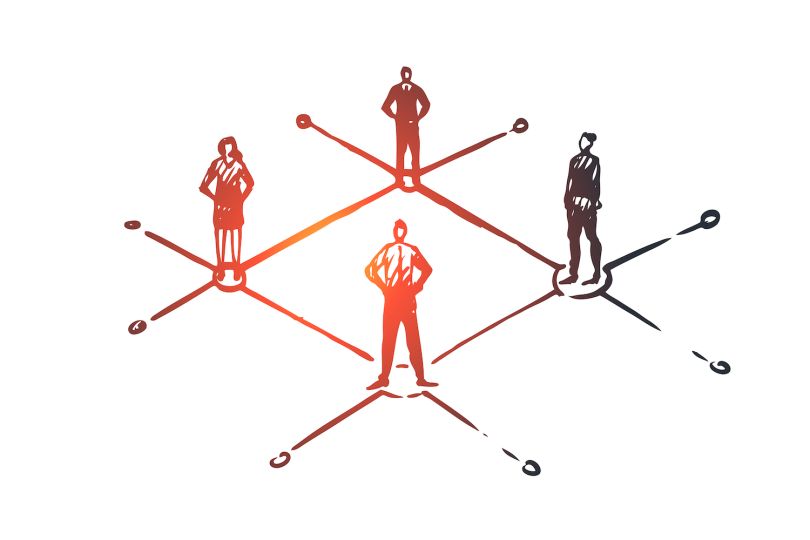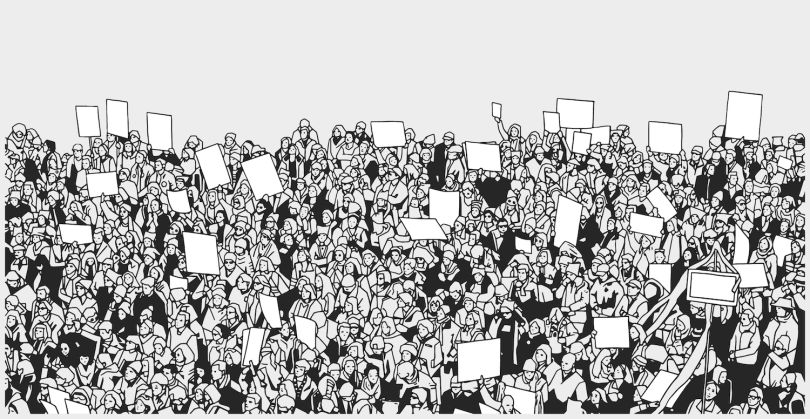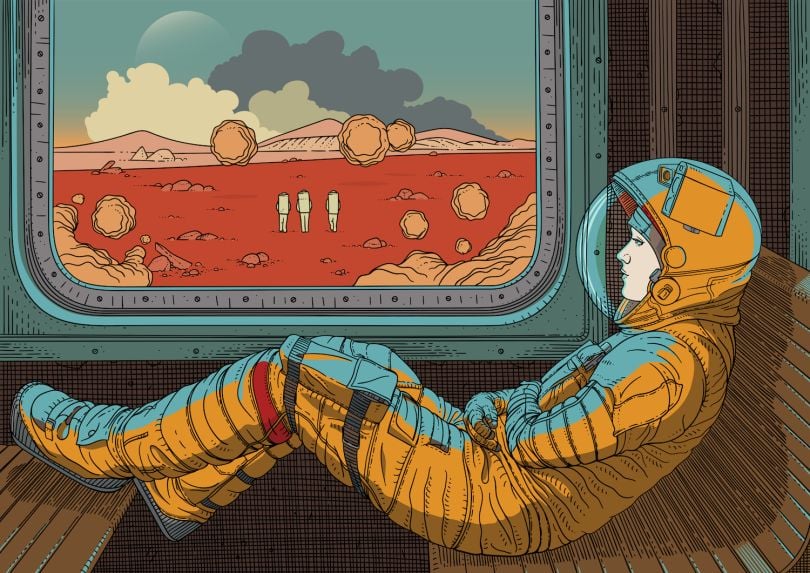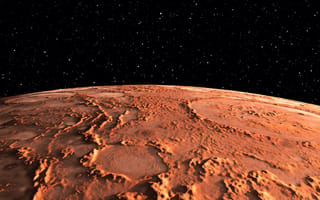“As humanity prepares itself to become an interplanetary species, today we announce our plans to design governance tools for the first Martian civilization to inhabit the red planet.”
That’s @DemocracyMars’ first tweet, from April 1, 2018. After that, the account went virtually silent for two years, until on June 4, it re-introduced itself, saying: “Interplanetary democracy. Yes, that’s the tweet.”
With that, Democracy Mars released its platform, an online place for Mars enthusiasts to gather, draft a planetary constitution and collectively fund Mars-related projects.
“We have the technology to implement a direct form of democracy.”
So, what happened in between? Two things: First, a young technologist named Diego Estevez reached out to the Democracy Mars account owner, programmer and activist Santiago Siri, and asked to help out. Estevez graduated high school in 2019 and spent his gap year helping out with projects within the Harvard University math department. He found Democracy Mars and figured his schedule had room for one more project.
“I did some calculations and realized it wouldn’t be such a big time commitment, at least at the beginning,” Estevez told Built In.
The second thing that happened was a spike in popularity for decentralized autonomous organizations (DAOs). Democracy Mars is a DAO. So is its parent project, Democracy Earth. Both aim — in the most general terms — to lower the costs and boost the benefits of human coordination. They do this through blockchain-based contracts that govern how groups coordinate and remove the need for central authorities.
“I truly believe that we’re at a point in time where it’s appropriate to start asking questions about the best way to structure society and actually try to implement that,” Estevez said. “We have the technology to implement a direct form of democracy. Democracy Mars seemed like a good excuse to try to validate that idealistic vision.”

What Are DAOs?
Blockchain technology enabled the creation of cryptocurrency: Every machine running a particular blockchain protocol could exchange funds, and the blockchain itself would keep track of the transactions. That eliminated the need for banks, or centralized financial authorities.
DAOs do the same thing for group coordination.
The first DAO, aptly named “The DAO,” sprung up in 2016. It was built on the Ethereum blockchain, its code was open source and, while written by developers from the company Stock.it, it had no true owner. The organization was decentralized, in that it belonged to its shareholders.
In two months, the DAO raised more than $150 million in Ether tokens from more than 18,000 investors, for the purpose of crowdfunding blockchain projects. Contractors could submit project proposals, and the funds would be allocated through a direct vote from DAO participants, who earned voting rights based on the size of their investments. Any profits from the projects would go back to the shareholders.
The DAO relied on technology called smart contracts, blockchain-based software that enforces legal relationships through the immutability of its code. Unfortunately, that didn’t stop a hacker from finding a bug and stealing $50 million from the group. To recover the money, Ethereum developers decided to do what’s called a “hard fork,” splitting the blockchain into two branches — one with the hack, one without.
“Yeah, shit happened, but let’s learn about what happened.”
The DAO was both a colossal failure and historic success: It showed that people were open to the idea of investing with DAOs.
“Even though it was hacked, that was a huge experiment, and people took it in a good way. Like, ‘Yeah, shit happened, but let’s learn about what happened,’” said Maria Gomez, a researcher for Aragon, an open-source software framework for DAOs. “A lot of people started working around smart contract upgradability and security. People saw the power of the [blockchain incentive] token, and projects started to follow that lead.”
So, DAOs had a resurgence, fueled in part by the introduction of the Moloch DAO, a “minimum viable” DAO initially created to raise funds for the development of Ethereum upgrades.
Moloch was named for a Canaanite god the Hebrew Bible associates with child sacrifice — which is actually relevant. According to the religious text, some societies sacrificed children to Moloch. This would have objectively weakened their groups, but if the practice was culturally ingrained, it would have been difficult to coordinate and stop. In an essay by Scott Alexander titled “Meditations on Moloch” from the now-defunct Slate Star Codex blog, he outlines some contemporary scenarios where lack of trust and the cost of coordination lead to poor outcomes, like overfishing and arms races.
Moloch DAO’s creators cite this logic as their inspiration for a simple, drag-and-drop DAO model that could work for many types of group coordination. When group members have a common interest and a smart contact that ensures group assets can only be spent with majority approval, it becomes easier to coordinate — even with people they’ve never met.
“You see communities on Reddit or other social media where people gather and express their opinions, but nothing more than that happens.”
Simpler and more secure than the original DAO of 2016, Moloch DAO spun out into various offshoots, and new DAOs used the framework for their own efforts. Meanwhile, platforms like Aragon provided a home and ecosystem for decentralized businesses, investment funds and social groups.
As the number of DAOs steadily climbed, former Aragon executive director Stefano Bernardi wrote a blog post declaring 2019 the “year of the DAO,” pointing to six global trends driving their adoption. One of those trends was the “normalization of participation in governance” — he cited open-source communities as an example. Another was the meteoric rise of social media activism and political organization.
“As discontent rises, people are looking for ways to channel that frustration into action,” Bernardi wrote. “It seems likely that, as better coordination tools become available, they’ll find a ready audience with those who want to transform the world around them, and don’t have time to wait for bureaucratic organizations to catch up.”
In other words, what if all those likes and upvotes could be channeled into something more concrete?
“You see communities on Reddit or other social media where people gather and express their opinions, but nothing more than that happens,” Gomez said. “With a DAO, people have a token and some economic incentive to organize and build things. So it’s like more than just sharing your thoughts, it’s moving to action. You can raise money among all these different participants and put it together for a common mission.”

Can DAOs Be a Tool for Democracy?
Mars doesn’t have people on it yet, but it probably will sometime soon-ish.
Elon Musk, whose company SpaceX is committed to sending humans to Mars, explained at a 2016 ReCode event why he believes a direct democracy will be the best form of government for the red planet, the Verge reported.
In a direct democracy, citizens vote directly on issues, rather than electing representatives who reflect their views. That decentralization, Musk said, reduces the risk of corruption.
People make similar arguments for cryptocurrencies and smart contracts. If DAOs can help people manage money, why couldn’t they help people manage their governments?
That’s precisely what Democracy Mars’ predecessor, Democracy Earth, proposed.
“Democracy Earth Foundation is building free, open-source software for incorruptible blockchain-based decision-making (voting) for institutions of all sizes, from the most local involving two people to the most global involving all of us,” the foundation’s originators wrote in an exhaustive white paper outlining the project’s ends and means.
The manifesto involves many working parts, but here’s the gist: Each participant in a governance-focused DAO would receive equal voting power, but only upon proving their “self-sovereign identity.” That means bots can’t vote, and nobody can vote twice.
There’s a lot that would need to happen before Democracy Earth’s long-term vision could become a reality. But some components are already being piloted.
For instance, quadratic voting, concepted by Microsoft-employed economist Glen Weyl and teased in the Democracy Earth white paper, made an appearance in the Colorado State House of Representatives. With quadratic voting, each voter buys or is granted a certain number of votes. Then, they allocate their votes among the issues that matter most to them. But, as Bloomberg put it in this write-up, quadratic voting makes zealotry expensive. Vote “yes” on an issue once, it costs one vote. But vote “yes” on that issue twice — that costs four votes. The cost of supporting a particular issue increases quadratically.
Other groups, like BrightID and the Idena Network, are working toward solutions to the (huge) problem of verifying virtual identities. Democracy Earth itself launched a probabilistic model that assigns a “personhood score” based on an entity’s participation in various DAOs. (Ameen Soleimani, one of the creators of the original Moloch Dao, scored a 69 percent likelihood of being human, according to a tweet from Siri following the feature’s launch.)

What About Mars?
DAOs help coordinate people to fund projects. They could also be used for governance. So, could a DAO help establish democracy on Mars?
Theoretically, yes. Using DAOs for governance is very much possible, Gomez said, but they come with a set of unique challenges. In an investment-focused DAO, for instance, it makes sense that people who contribute the most tokens would hold the most shares and, therefore, the most voting power. But in a DAO for governance, it’s the equivalent of buying votes.
We’re starting to see tools that mitigate those risks, though, Gomez said. Giveth, an open-source platform for what it calls “decentralized altruistic communities,” introduced a feature called conviction voting, in which community members vote on issues continuously, instead of during one time frame. They can even change their votes as their convictions change. That way, the votes of community members who have been around a long time and held fast to the same ideals will hold more weight, while newcomers and the indecisive have less sway. This framework effectively prevents both collusion and “Sybil attacks,” in which fake identities sway the outcome of votes.
Aragon is also introducing a Courts function, so human jurors can help settle tough disputes in Aragon-powered DOAs. That will potentially prevent pushy majorities — or well-funded minorities — from making decisions against the best interest of the group as a whole.
Despite these innovations, there are still “many problems” with launching governance DAOs, Gomez said, but she’s hopeful about the future. For her, the main benefit of democracy-focused DAOs is not expanding access to the system, but building trust in the system.
“You trust the system, you trust that protocol. You don’t need to trust the people.”
“The way that it’s going to help governance is not because it’s going to give more tools so people can participate more, but because some rules are going to be automated in the smart contracts,” she said. “So you trust the system, you trust that protocol. You don’t need to trust the people.”
Dwindling trust in central institutions is what got Estevez interested in blockchain in the first place. After watching the proliferation of fake news during the 2016 U.S. presidential election, he built a social network, TotalStories, that used machine learning to predict the accuracy of news articles. Later, he rebuilt the network on a blockchain to make the tool more collaborative.
“I was pretty fascinated by the option that you could have these decentralized applications where anyone could interact without having to trust each other,” he said.
Now, the Democracy Mars project is cut from the same cloth. It’s open to participants from around the world. Its Telegram group currently has 15 members, and on July 13, DAO members voted on a draft of the Martian Constitution.
Would bigger, stronger centralized governments honor such a constitution? It isn’t likely. As Michael Coren wrote for Quartz, the maligned Moon Agreement of 1979 showed national governments don’t take kindly to infringements on national rights or attempts to redistribute profits when it comes to space exploration or trade. As countries scramble to determine the boundaries of space law, it’s probable Mars will be treated like a spliced-up collection of national colonies, rather than a self-determining sovereignty.
What does that mean for Democracy Mars?
“They’d need to have a legal wrapper and that’s attached to a jurisdiction, so they better decide on a very friendly jurisdiction that tomorrow is not going to stop any of that activity,” mused Gomez, who used to be a corporate lawyer.
But for Estevez, the technicalities aren’t the point.
“It’s basically an opportunity for anybody to get involved and have a voice in how we explore different planets,” he said. “I think that best represents the ideals of space exploration, which is supposed to be something for the benefit of all mankind.”
Unlike other investment funds and firms with eyes on the red planet, Democracy Mars is for everyone. According to Estevez, this DAO and others like it will fulfill a need when — whether in five years or 30 — conversations start swirling about the best form of government for Martian settlers, which he believes will be a decentralized democracy. If the majority of colonists wanted it, it would fall within their right to self-determination.
“Yo, I got a question: Is it truly democratic if people with more [tokens] get greater voting power?”
In the meantime, Estevez is using his free hours to recruit new Democracy Earth members and help them navigate the DAO landscape, some for the first time. On June 16, a member named Jesse wrote in Telegram: “Yo, I got a question: Is it truly democratic if people with more [tokens] get greater voting power?”
Estevez responded: “We are working on a layer 2 that would provide a quadratic voting platform for members of the DAO to vote, irrespective of how [many tokens] they contributed. I personally think it’s reasonable for the people who contributed the most to the bank to be able to gain a proportional share of the voting power on how to spend the bank, but it wouldn’t align with the values of the project for this to extend to the proposals of the constitution.”
Estevez said he’s stopped trying to explain his visions for a blockchain future to crypto-eye-rollers. Skepticism surrounding the technology keeps fair-weather DAO participants away, he said, which is a good thing. But it also scares away some talented contributors. Either way, the 19-year-old feels he’s in the right place.
“I’m not a religious person at all, so I’m a true believer that we have a very limited time on this Earth, and the question is how can I make use of my time in the best way possible,” he said. “Right now it seems to me like working on Democracy Mars is a good way of making use of my time, my efforts, and my youth, in some way.”




